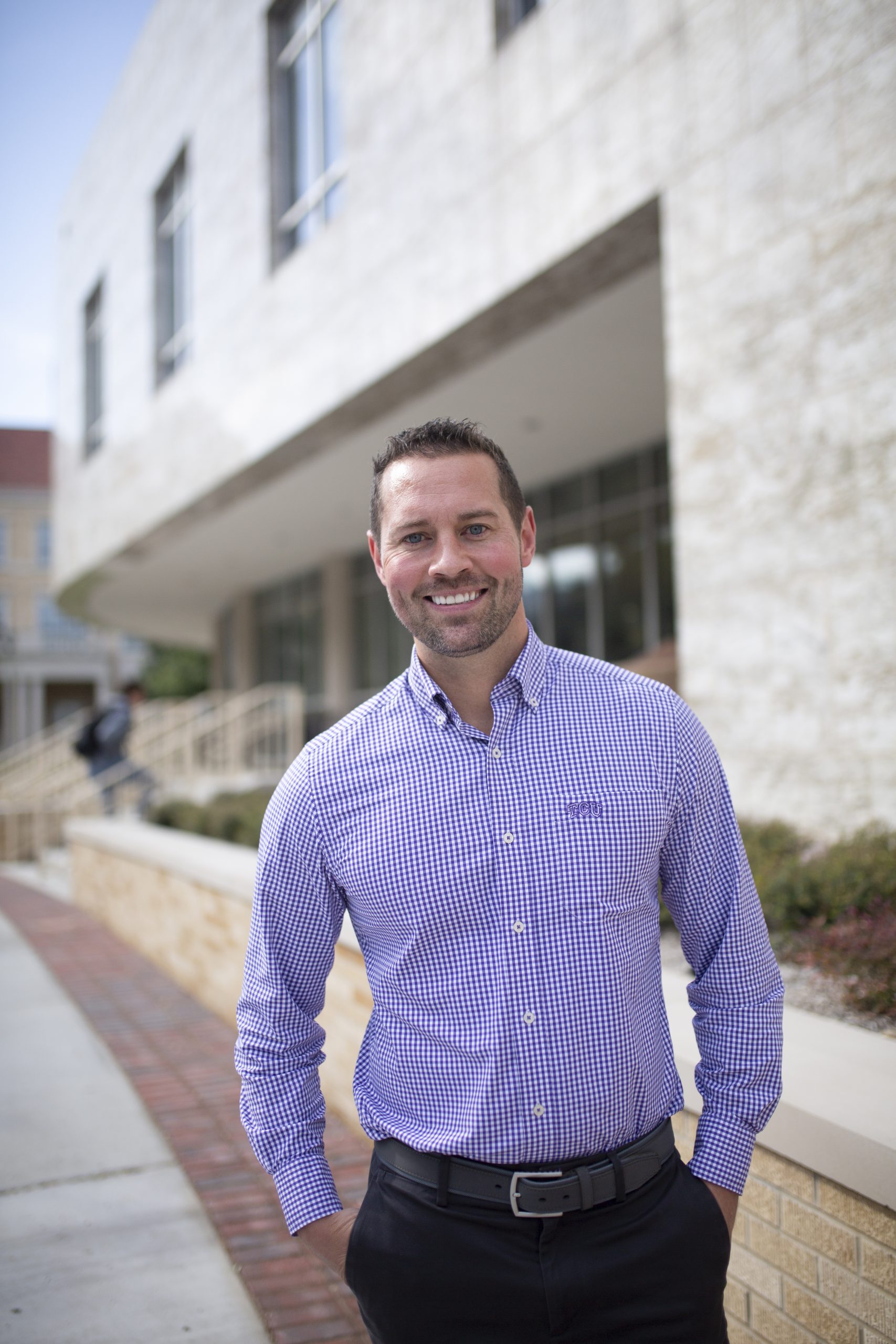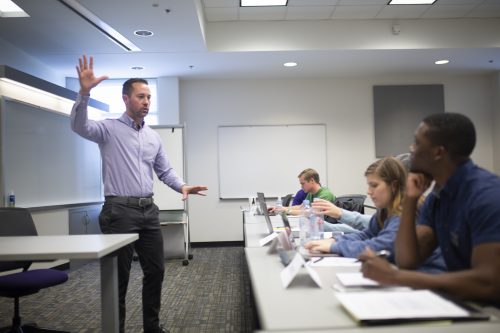March 24, 2020
How to Be a Better Salesperson
Zachary Hall says the magic is in perceiving customers’ needs.

Zachary Hall learned how to support himself at age 15 and now he teaches others to be self-reliant. Photo by Rodger Mallison
March 24, 2020
How to Be a Better Salesperson
Zachary Hall says the magic is in perceiving customers’ needs.
Zachary Hall, an associate professor of marketing and director of operations for the Sales and Customer Insights Center, applies lessons he learned from playing professional poker to understand how salespeople make accurate, intuition-based judgments.
After 10 years of selling customized research projects to some of the world’s largest companies, you chose to pursue formal academic studies in sales and marketing. Why the switch?
When I was 15, my parents moved away. I lived on my own, paid rent, worked and eventually became a professional poker player. For 10 years, I played cards to pay for rent and school. In my senior year of high school, I did independent study at West Texas A&M University. I met this professor, Dr. James Griffith, who was going to help me do research on social psychology and why people make decisions because I was interested in how that could help my poker career. Through him I saw a lifestyle I really wanted. I grew up extremely poor, but in academia you work hard for nine months helping people enrich their lives, changing their lives, and then you have summers off for family. It really coupled two of my passions of being able to help people and companies as well as having that flexibility to see family and friends and travel the world.
What role does the field of sales play in society?
“Nobody realizes that almost every job in this world requires sales.”
Zachary Hall
Sales has evolved. Years ago, you had the slick, persuasive sales techniques to push things, and customers weren’t that knowledgeable, so they didn’t know what was going on. As customers became more knowledgeable, they demanded something else from salespeople. I think many students don’t view sales as a glamorous career. Nobody realizes that almost every job in this world requires sales.
To me, personal selling goes to the idea of what is termed consultative selling. It’s working with a client, helping them identify their problem, and most of the time they don’t know what it is. You’re collaborating with the customer and then coming up with a creative solution to the problem. It’s not about the sleazy car salesman or the person working at the Gap. It’s helping people, changing their lives and proving that when you do that, and you find a company you’re passionate about, you’re going to make more money than you’d ever make with just about any other major.
The ways people buy and sell goods and services are changing with technology. What does this mean for sales?
Personal selling is typically used for things that are a little more complex, that have a higher profit margin and uncertainty. But a lot of retail businesses and restaurants are eliminating personal contact because the customers have a simple problem. They’re hungry or they’re thirsty. They don’t need a barista. They want consistent coffee.
“The customers are demanding time, efficiency and a different experience. They’re not demanding a barista.”
Zachary Hall
So how do you increase sales margins? You make the experience match the customers’ desires. People do internet shopping because they no longer need a person to show them different things. A shopper can do that in two seconds while waiting for coffee that they paid for on their phone. The customers are demanding time, efficiency and a different experience. They’re not demanding a barista.
People have always said technology is going to eliminate the need for salespeople. Now technology has added more possibilities for salespeople to better understand their customers’ problems more quickly and in more complex ways.
Your overall research arc focuses on the benefits salespeople gain from making accurate, intuitive judgments about consumers. You won the American Marketing Association’s SIG Sales Excellence in Research Award in 2016 for a study about sales intuition. What drew you into this line of inquiry?
A lot of my research is through the foundations I learned in poker, which I view as selling or persuasion because it’s all about adaptive communication. It really starts with first understanding yourself: your own tendencies, your own flaws, your own strengths, and then you have to learn to control yourself. The third step is to know other people, their strengths and weaknesses, and then you have to act appropriately.
How did you start studying salespeople and perception?
Some older students at the University of Houston, where I did my PhD, brought me along to some companies to interview their salespeople, who told me: “You should never judge your customers. You should never look at them and think, ‘I should show them this car or bed.’ We should treat everybody the same.” I thought, that’s absolutely wrong. We naturally judge people — not good or bad — but we have a preconceived notion when someone walks into the door. I believe that those judgments impact how we treat people, and if we’re censoring our judgments, salespeople will be incorrect. The older students told me to prove it.

Zachary Hall teaches students to rely on empathy and intuition when it comes to helping customers. Photo by Rodger Mallison
For my dissertation, I designed a study where I hired 20 of our undergrads at the University of Houston as research assistants. They spent over 1,500 hours in mattress stores, watching customers, assessing if the salespeople made accurate judgments about them or not through interviewing the customer before and after the interaction. It showed that if the salespeople accurately judge their customers, just off of what they are wearing and what they’re driving, their sales go up 138 percent, which is equivalent to $1,300 an hour. A lot of my research now is looking at how do we actually train those skills to make salespeople better at reading surface cues and then making accurate judgments.
You published a recent study about how salespeople can get off to a good start in a potential transaction. What did you find?
To start the interaction right, you have to be prepared. You have to match the context. You have to have the appropriate level of professionalism. You have to have the appropriate level of pre-call planning, which means knowing different customer types and what their buying behaviors are. Typically, you have to learn from your mistakes. You should try to understand each sales call, what went right, what went wrong, and then debrief after those and learn through time. That’s really what the idea of starting right comes from — pattern matching.
Your research claims empathy is a skill that managers can teach their salespeople to improve their intuitive perceptual accuracy. How does one teach empathy in a business setting?
You can do perspective-talking training where you try to understand what someone is thinking and then have them talk about what they’re thinking. That can really help people get into the minds of other people, but again it comes back to pattern matching. I can’t understand someone unless I actively try to take their perspective, make a hypothesis, either fail or succeed and then digest why I was right or wrong. Then I must do that over and over again until it becomes non-conscious.
“People think sales is pushing a product, but sales is consulting. It’s identifying a problem and solving it.”
Zachary Hall
We have to accurately read our customers because if we don’t, we don’t know their problems, we don’t know their needs. If we don’t know those two things, then we can’t really solve their problems. I think that’s a huge misconception of sales. People think sales is pushing a product, but sales is consulting. It’s identifying a problem and solving it. Without accurate judgments, we can’t ever get there.
Where does a someone draw the line between making an accurate intuitive judgment and a judgment based off of rote experience?
To be able to make what I call skilled intuition, you need experience. Then you can typically make accurate intuitive judgments better than leaving it up to chance. All of us are going to make intuitive judgments, but developing skilled intuition requires experience and learning.
In spring 2018, the Sales and Customer Insights Center opened at the Neeley School of Business. Its stated purpose is to increase research collaboration, engage faculty with the Dallas-Fort Worth business community and strengthen student learning through hands-on activities. How would you describe the center?
The key of the center is developing great young talent. The goal is to bring the business community and academia together so that we can develop young talent, do world-class research and bring an outside perspective to our students. We teach through sales education and customer insights, which means understanding how customers think through data and experiments.
Editor’s note: The questions and answers have been edited for length and clarity.

Your comments are welcome
Comments
Related reading:
Alumni, Features
Andy Mitchell Snags Weinstein Film Library
The alumnus used business intuition and a winning personality to become a major player in Hollywood finance.
Alumni, Features
How to Succeed in a Two-Part Career
Matt Loeffler leads a business while he keeps one foot in football as an SEC referee.
Features
Skincare With a Conscience
FarmHouse Fresh sells locally grown, natural skincare products and provides sanctuary for rescued farm animals.